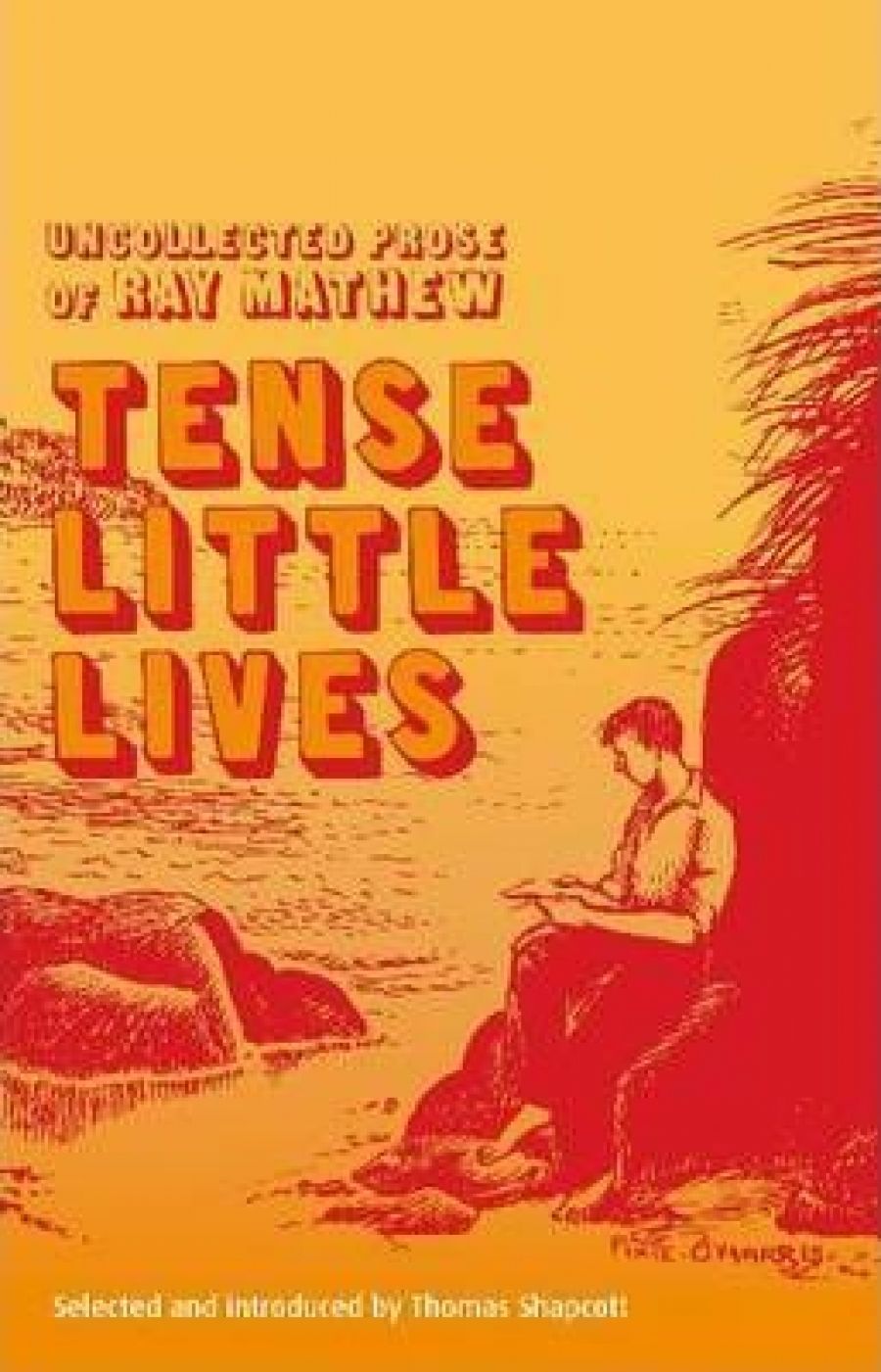
- Free Article: No
- Contents Category: Short Stories
- Review Article: Yes
- Article Title: The transgressor
- Online Only: No
- Custom Highlight Text:
If we keep hearing about our famous expatriates, the Greers and Jameses and Hugheses and the like, it is because they have made it their business to ensure we do. Gone but not forgotten. Others such as Randolph Stow or Alan Seymour were less busy at self-promotion. But Ray Mathew was a mere rumour. You saw his books here and there in the antiquarian bookshops, especially the short stories, A Bohemian Affair (1961), and the joint collection with Mena Abdullah, Time of the Peacock (1965). Some of his plays were eventually gathered into representative collections. Mathew himself seemed to disappear into thin air. Tom Shapcott’s project is to retrieve a writer he believes we should have paid more heed to.
- Book 1 Title: Tense Little Lives
- Book 1 Subtitle: Uncollected prose of Ray Mathew
- Book 1 Biblio: NLA, $29.95 pb, 336 pp
It is the writer rather than the writing that comes through most strongly in Tense Little Lives: Uncollected Prose of Ray Mathew. Shapcott’s introduction is little short of riveting. In his time, the 1950s and early 1960s, Mathew was everywhere, seemed to know everyone and to have done everything. He published poems, plays, short stories, critical monographs, a novel. He trained as a teacher but then worked at the CSIRO; he was a furniture mover and a shop assistant, a tutor and then lecturer in English at the University of Sydney. He left for London in 1960 on an Arts Council award for drama, lived a while in Italy and then in New York, never returning to Australia, in spite of occasional pangs of nostalgia. He impressed many of those he met – among his perceived gifts were charm and friendship.
But there are different ways to read such a life. Gusto is sometimes dismaying. Friendship is, desirably, generous; it can also be a disguised selfishness, a battening on to others. Was Mathew’s a life given over to seizing life’s possibilities, or fecklessness? That is the deep attraction of Shapcott’s introductory essay: the evidence that Mathew may well have been some sort of self-obsessive horror, like the protagonists in the selection of prose presented here.
At the time of Mathew’s departure for London, the short story writer E.O. Schlunke committed suicide; Schlunke’s wife, Olga, wrote just before that tragedy, hoping never to see Mathew (‘Dear Heart’) again. ‘Eric must never know about this … Oh, how bloody exciting life is.’ Mathew’s partner in London also committed suicide, just after Mathew had returned from several years in Italy, rent-free, dancing attendance upon an Italian princess (‘Nankj will eventually try to get me to bed – I think she was trying tonight’). Hal Porter left an obliquely excited letter but was much too cautious to commit himself, in writing, to more than arch manoeuvres. In New York, Mathew eventually moved into the Waldorf Astoria apartment of his patron, Eva Kollsman, where, writes Shapcott, ‘he settled into an intense and emotionally satisfying relationship’ with her – whatever that might mean. His letters to Pixie O’Harris hint at an answer, but you can’t tell whether that was writing for effect.
This is all patently the material of Mathew’s poems and plays and stories. In a sense, he never got over the bohemian affairs of the 1950s, the delight in being provocative, in transgressing the acceptable. The pity of it is that this vital élan is now so passé, even humdrum. Mathew’s ‘sophisticated sexual urges’ have long since been by passed by SBS and whatever you fancy on the internet. His writing has the eeriness of an old recording, a voice from another time and place.
Which is not to dismiss him. It is, rather, to see just how much his writing was a product of its times, and how constrained he actually was by the fashions of his day, if not steamrollered by them. His fiction is organised with a dramatist’s eye. He relies on nuanced dialogue and gesture, for example, which now reads as essentially mannered, arch and occasionally campy. More Noël Coward or Hal Porter than progressive. The same thing happened with his plays, in point of fact, for he chose to write at the same time as Arnold Wesker, Harold Pinter, and John Osborne, which was not good timing on his part. The well-made play such as Ray Lawler’s Summer of the Seventeenth Doll (1955) was anathema to him. He was never going to be mainstream.
The earlier stories in this collection ask us to admire a brittle protagonist, something of a Pan-figure, challenging and leading on toward the inevitable consummation. No surprises there. The manoeuvres are irritatingly adolescent, and mostly unamusing. Like the Chaser team, Mathew confuses cleverness with wit, so that the seduction becomes accidentally menacing. As the story moves to its end, the camera lens moves in, for the presentation crosses from theatre to film, with a hammy closeup shot in the final gesture. In another story, with a somewhat prissy girl from a good background – Mathew confessed he did not know how such people really live and talk – the eventual climax reads like a parody of Patrick White: an astounded victim watches while a grimly amused landlady thrashes the buttocks of her violator with his own leather belt. The point of this is to effect a character change in the young woman, her liberation. As if. Later stories range from something like a mock-up for a sub-cult cartoon strip (explicit scenes, parental guidance recommended) to a quaint, incomplete quasi-Edwardian story about orphan children. It is hardly surprising that these never found their way into print.
Ray Mathew’s stories read not only as dated but dated in their own time. Hal Porter did it much better, dear boy.


Comments powered by CComment